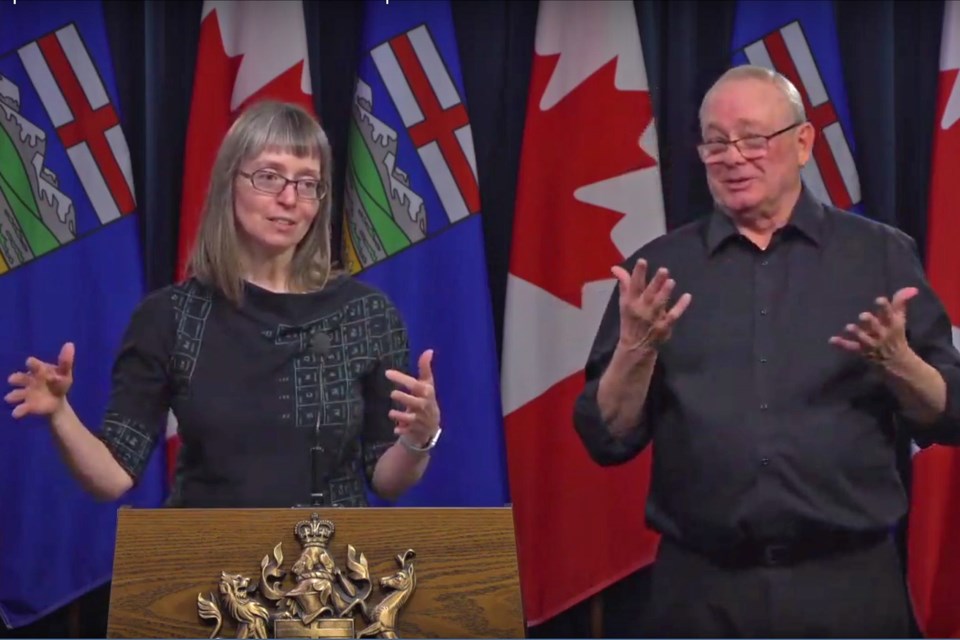There are 23 new confirmed cases of COVID-19 in Alberta, bringing the total number of cases in the province to 97. Cases have been confirmed in all zones across the province.
Five people are receiving treatment in hospital, two are in intensive care. All others are self-isolating at home and expected to make a full recovery.
Dr. Deena Hinshaw gave an update in-person on March 17 after testing negative for the COVID-19 virus earlier in the day.
The update comes after Premier Jason Kenney declared a state of public emergency because of the COVID-19 outbreak, along with additional measures to support social distancing.
"Today on St. Patrick's Day I know this will disappoint many, but we must take action to prohibit the amount of time Albertans are spending in crowded places,'" Hinshaw said.
While a majority of cases are travel-related or through close contact, there are signs of increased community transmission.
Hinshaw said there are approximately six cases stemming from community transmission split between the Edmonton and Calgary zones, though those cases are still under investigation.
"There are six we are concerned about at this time, and we will have more information tomorrow."
Ten cases are thought to come from a home gathering, and Hinshaw said a dental conference in Vancouver has been linked to six cases.
As of Tuesday afternoon, the province's COVID-19 self-assessment site had had over one million views.
To ensure there is enough capacity to handle an increase in cases needing hospital care, Alberta Health Services (AHS) is postponing all scheduled and elective surgeries, Hinshaw said.
Urgent and emergency surgery, as well as oncology and scheduled cesarian procedures will continue.
AHS will be contacting Albertans scheduled for procedures, and will reschedule as soon as possible, she said.
"We understand many of you will be anxious to hear from AHS about your surgery. We ask for your ongoing patience. Please do not call 811 or the clinic, you will be called by AHS," Hinshaw said.
"This decision will have an impact on those waiting for elective or non-urgent procedures, but it is a necessary step to ensure the health system can sustain its pandemic response and be able to respond to emergencies."
Dr. Mark Joffe, AHS vice-president, said the province has been looking at the number of beds and spaces needed to provide care for cases requiring hospitalization.
"In working through those numbers, it became apparent that we need to start ramping down some of the activities that we typically do," Joffe said.
He said AHS will be focussed on creating space in order to provide care, ensuring they have the equipment and sufficient trained healthcare staff to assist Albertans.
There are currently three assessment centres open in Edmonton, a second centre has opened in Calgary, and there are two in the Central zone, according to Joffe.
Additional measures include:
- Mass gatherings are now limited to no more than 50 attendees. This includes worship gatherings and family events such as weddings. Grocery stores, shopping centres, health-care facilities, airports, the legislature and other essential services are not included.
- To limit the amount of time Albertans are spending in large crowds and crowded spaces, all Albertans are prohibited from attending public recreational facilities and private entertainment facilities, including gyms, swimming pools, arenas, science centres, museums, art galleries, community centres, children’s play centres, casinos, racing entertainment centres, and bingo halls.
- Sit-down restaurants, cafés, coffee shops, food courts and other food-serving facilities, including those with a minors-allowed liquor license, are limited to 50 per cent capacity to a maximum of 50 people. Take-out, delivery or drive-through service is permitted. Licensed facilities will also be permitted to deliver liquor.
- At this time, not-for-profit community kitchens, soup kitchens and religious kitchens are exempt, but sanitization practices are expected to be in place and support will be in place for this practice.
- Until further notice, all Albertans are restricted from attending bars and nightclubs, where minors are prohibited by law.
"The measures introduced today will be hard on all of us, but I believe we are ready and able to rise to the challenge before us," Hinshaw said.
With these measures, the province expects to see signs of an effect within two weeks, which is the incubation period of COVID-19.
"We would expect to see our numbers continue to rise over the coming days, we would expect that may be sustained within the next couple of weeks, but within two weeks we would see the impact of those measures," she said, noting travellers will continue to come back into the province from outside of Canada.
"I know many people would like a date to when we're going to stop (these measures), but really that's going to depend on watching the data closely."
First Nations are encouraged to develop community response plans with Indigenous Services Canada and their Directors of Emergency Management and First Nations Field Officer.
Metis settlements are encouraged to develop response plans with their Directors of Emergency Management and Field Officer.
RELATED: Alberta declares public health emergency
As of March 17, there are 70 cases of COVID-19 in the Calgary zone, 20 cases in the Edmonton zone, three cases in Central zone, three cases in the South zone, and one case in the North zone.
Hinshaw said the province is working on a map within 24-hours to show the exact locations within provincial zones of confirmed cases.
For the latest COVID-19 updates, check out our local coverage here.




